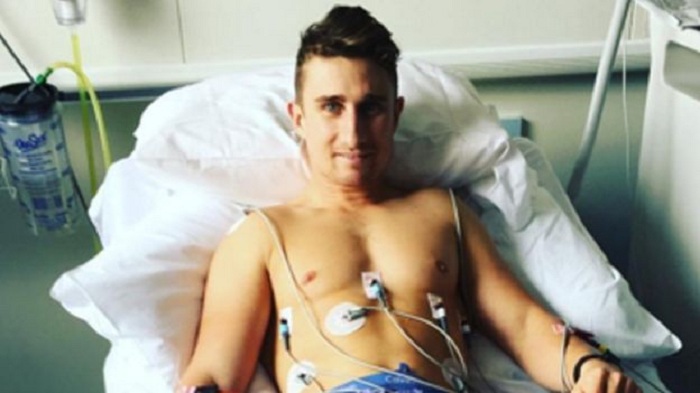It said there was now a better grasp of the prevalence of inherited conditions.
A child of someone with an inherited heart condition can have a 50% chance of inheriting it themselves.
The foundation warned that the overall figure for those with the faulty gene could be much higher because of as yet undiscovered faulty genes and under-diagnoses.
Each week in the UK, around 12 seemingly healthy people aged 35 or under are victims of sudden cardiac death with no explanation, largely due to undiagnosed heart conditions.
`I should have died`

Cricketer James Taylor retired in 2016 after he was diagnosed with a serious heart condition
Former England and Nottinghamshire cricketer James Taylor had to retire last year, at the age of 26, after he was diagnosed with the serious heart condition arrhythmogenic right ventricular cardiomyopathy.
He told BBC Radio Four`s Today programme that he had been warming up for the first game of the season in Cambridge when his heart started "going mental in my chest".
He said: "You could see my shirt moving, that`s how hard my heart was beating inside my chest...
"I went off, I had some oxygen, then I went to hospital some hours later.
"When I walked in to hospital they said it was a miracle I was able to walk in.
"My heart rate was going at 265 beats per minute."
A normal resting heart rate is 60 to 100 beats a minute, but Taylor`s remained at 265 for six to seven hours - "the equivalent of doing five, six marathons."
He now treats the condition with medication and said he was fortunate to survive.
"I`m still alive. I should have died - that`s the scary thing about these inherited heart conditions.
"A lot of people don`t get the opportunities I had and it`s often too late."
The Birk family, from Hounslow, in west London, were tested for the faulty heart gene after Maninder Birk collapsed at home on his 16th birthday.
The results showed that Maninder, his younger brother Manvir and his mum Inderdeep all had the faulty gene hypertrophic cardiomyopathy (HCM).
Inderdeep said it was "completely devastating" to discover her sons had inherited it from her.
`Constantly tired`
She says the heart condition has presented itself differently in each of them.
"Maninder had to give up a promising career in rugby, but is now leading a relatively normal life. But Manvir and I struggle day-to-day with our health.
"Manvir can`t finish a whole day at school. He is constantly tired and his energy levels are very low. He is mainly home-schooled now as it is hard for him to keep up with his work.
"He also misses out on seeing his friends as he can`t do the normal activities most 15-year-olds can do."
They have both had implantable cardioverter defibrillators (ICD) fitted to prevent their hearts from stopping suddenly.
Research has helped to discover many of the faulty genes that cause inherited heart conditions.
This has led to the development of structured genetic testing services for those at highest risk for some of these conditions.
However, the British Heart Foundation says more research is urgently needed.
Prof Sir Nilesh Samani, BHF medical director, said: "The reality is that there are hundreds of thousands of people across the UK who are unaware that they could be at risk of sudden death.
"If undetected and untreated, inherited heart conditions can be deadly and they continue to devastate families, often by taking away loved ones without warning.
"We urgently need to fund more research to better understand these heart conditions, make more discoveries, develop new treatments and save more lives."
















































